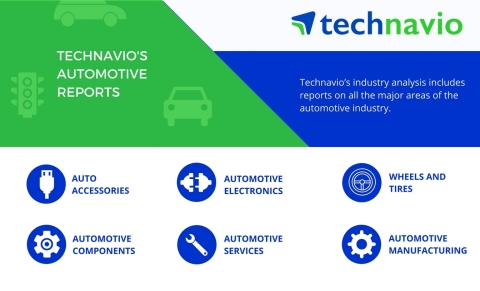LONDON--(BUSINESS WIRE)--Technavio market research analysts forecast the global automotive steering control module market to grow at a CAGR of more than 8% during the forecast period, according to their latest report.
The report further segments the global automotive steering control module market by application (passenger vehicles and commercial vehicles) and by geography (the Americas, APAC, and EMEA).
This report is available at a USD 1,000 discount for a limited time only: View market snapshot before purchasing
Buy 1 Technavio report and get the second for 50% off. Buy 2 Technavio reports and get the third for free.
Technavio analysts highlight the following three market drivers that are contributing to the growth of the global automotive steering control module market:
- Increasing demand for vehicles
- Improvement in safety and vehicle performance leading to an increase in adoption of EPS
- Increasing demand for fuel-efficient vehicles
Looking for more information on this market? Request a free sample report
Technavio’s sample reports are free of charge and contain multiple sections of the report including the market size and forecast, drivers, challenges, trends, and more.
Increasing demand for vehicles
The demand for passenger cars is increasing exponentially in emerging economies such as Brazil, China, and India because of the significant economic growth and increase in the purchasing power of consumers. There has been tremendous growth of emerging markets and the increase in global trade activities, particularly in the BRIC nations such as Brazil, Russia, India, and China. China's massive catalytic fiscal packages in recent years have made it the leader among emerging markets.
According to Ganesh Subramanian, a lead analyst at Technavio for automotive electronics research, “The economic growth of BRIC nations has fueled the rapid growth of the automotive industry. Saturated markets and intense competition have encouraged most of the global OEMs to shift their focus to these countries. This creates an opportunity for various automotive vendors and OEMs to promote their products and solutions across emerging markets.”
Improvement in safety and vehicle performance leading to an increase in adoption of EPS
Presently, safety is the most important factor driving innovation in the automotive technology. Electronic power steering is being adopted over hydraulic power steering due to enhanced safety, improved integration with advanced driver assistance systems, and better fuel efficiency provided by the electronic power steering. Earlier, hydraulic power steering was the most common form of steering assistance. It is still in use by many vehicles.
“A hydraulic power steering system is completely dependent on fluids that start presenting leakage issues over time, thereby increasing service and maintenance expense. The hydraulic pump in a hydraulic power steering system needs to continuously engage with the engine for its operation that leads to more fuel consumption. On the other hand, an electronic power steering system uses an electric motor to operate. This removes the need for automotive fluids and reduces servicing expenses,” says Ganesh.
Increasing demand for fuel-efficient vehicles
Hydraulic steering systems have been replaced by electric power-assisted steering (EPAS) systems to increase fuel efficiency in vehicles. It was found that replacing hydraulic systems with EPAS increased the fuel efficiency as EPAS only requires power while steering, unlike hydraulic systems that require continuous input from the engine to operate the hydraulic pumps.
The Euro 6 norms introduced in 2014 restricted the emissions levels of nitrogen and CO₂. This forced OEMs to adopt technologies such as EPAS. Emerging countries have already adopted a version of Euro 4 and 5 and will soon adopt Euro 6 norms during the forecast period. The need to reduce vehicular emissions has led to engine downsizing and light-weighting of vehicles.
About Technavio
Technavio is a leading global technology research and advisory company. Their research and analysis focuses on emerging market trends and provides actionable insights to help businesses identify market opportunities and develop effective strategies to optimize their market positions.
With over 500 specialized analysts, Technavio’s report library consists of more than 10,000 reports and counting, covering 800 technologies, spanning 50 countries. Their client base consists of enterprises of all sizes, including more than 100 Fortune 500 companies. This growing client base relies on Technavio’s comprehensive coverage, extensive research, and actionable market insights to identify opportunities in existing and potential markets and assess their competitive positions within changing market scenarios.
If you are interested in more information, please contact our media team at media@technavio.com.




